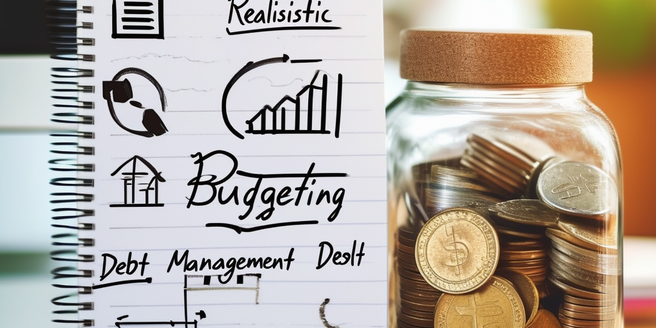Understanding the Basics of Debt Management
Debt management is a systematic, planned approach to reducing debt, involving practices such as formulating a realistic budget, reducing unnecessary expenses, and making consistent payments. Understanding debt management is key to breaking free from the continual cycle of accumulating debt. The first step is acceptance of your financial crisis, which involves acknowledging rather than denying your financial struggles. This is the initial step towards effective management. Then, thorough inspection of your finances is necessary. This involves an in-depth study of your income, expenses, and types of debts to pinpoint the root of your financial issues. Upon identifying the problems, you can effectively plan to alleviate the debts. Managing debt requires discipline, commitment, understanding of financial principles, accepting your financial situation, and importantly, developing and following strategic debt management practices. This steers you towards a healthier, more manageable financial future.
Strategies for Effective Debt Management
A multitude of strategies exist for efficient debt management, the most essential being making payments that exceed the minimum amount. This reduces the principal debt and the amount of interest charged on the balance, leading to quicker debt extinguishment. Another effective method is the consolidation of all your debts into a single payment. This reduces oversight risk, streamlines your commitments, and may even help you obtain a lower interest rate. However, while managing existing debt, it’s vital to prevent the accumulation of new debt. Effectively managing your debt isn’t just about handling existing obligations, but also abstaining from creating new ones. With effective management and careful planning, you can overcome this financial hurdle.
Debt Management and Financial Planning: A Symbiotic Relationship
The critical relationship between debt management and financial planning should never be overlooked, as these two components are intertwined and important for one’s overall financial stability. Successful financial planning, as a preventative measure, helps avoid extensive debt, while effective and strategic debt management relies on having a realistic financial plan.
In creating a financial plan, not only should a budget be included, but also an emergency fund. A budget allows individuals and families to allocate resources effectively, make informed choices, and steer spending and saving habits according to financial goals, reducing the chance of accruing debt. Additionally, an emergency fund is paramount, acting as a financial safety net providing a cushion for unexpected expenses, helping avoid excessive debt.
In conclusion, while proper financial planning can act as a safeguard against unnecessary debt, effective debt management is dependent on a well-constructed financial plan. Both creating a budget and establishing an emergency fund contribute to building financial resilience and protecting from undue financial crises. The relationship between debt management and sound financial planning is indeed vital and necessary.
Easy Financial Solutions for Debt Reduction
If you’re struggling with increasing debt, don’t fret, as there are financial instruments such as debt consolidation or loan modification that can help. These can streamline your monthly payments or even alter the conditions of your loan to grant more favourable terms. For an optimal outcome, consult a financial advisor who can evaluate your current situation and guide you towards the most effective solution.
Remember, with the right counsel, it’s entirely feasible to navigate towards financial stability and lighten the debt burden. Extensive research and consultation with a trusted financial advisor will ensure the best strategy for managing your debt. There are multiple resources to assist you, so remember you’re not confronting these concerns alone.
Taking Control: A Comprehensive Guide to Long-Term Debt Management Solutions
The path to gaining control over your debts requires long-term strategies, not quick fixes, incorporating sustainable tactics like living within a realistic budget and ensuring income covers expenses. It necessitates avoiding unnecessary expenses and differentiating between essential and non-essential costs, perhaps by dining out less or reducing vacations. The practice of saving for the future is crucial, not just owning a savings account, but maintaining a consistent habit, and investing these savings to grow your wealth over time. When debts become overwhelming, seeking professional guidance from financial advisors or debt counsellors, who are capable of navigating debt management complexities, is vital. The journey to financial freedom doesn’t offer immediate results; it requires persistence, patience, and consistently smart financial decisions, leading to a debt-free future.


